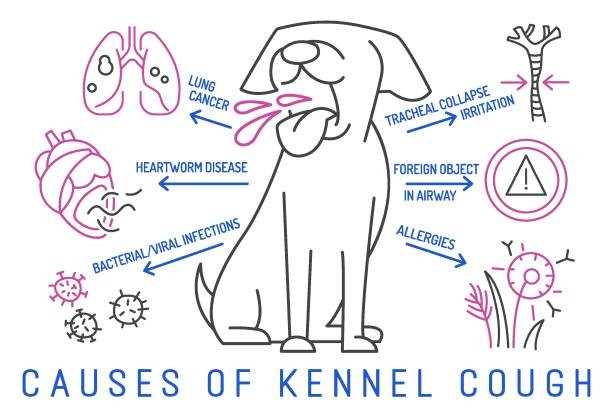What is Bordetella in Dogs?
If you have ever boarded your dog at a kennel or taken them to a dog park, you may have heard of Bordetella, a common bacterial infection that causes respiratory disease in dogs. But what is bordetella in dogs exactly, and how can you prevent and treat it? Here is everything you need to know about this contagious condition.
What Causes Bordetella in Dogs?
Bordetella is the name of a genus of bacteria that includes several species that can infect animals and humans. The most common one that affects dogs is Bordetella bronchiseptica, which is also known as kennel cough. This is because the bacteria can easily spread in places where many dogs are in close contact, such as kennels, dog parks, grooming salons, or veterinary clinics. Bordetella bronchiseptica can infect the respiratory tract of dogs and cause inflammation of the trachea (windpipe) and bronchi (airways). This can lead to coughing, sneezing, nasal discharge, and sometimes fever or loss of appetite. The infection can also make dogs more susceptible to secondary infections by other bacteria, viruses, or parasites.

Recognizing Kennel Cough in Your Dog
While most cases of Bordetella are mild and resolve on their own, it’s important to be aware of the symptoms and potential complications. Here’s what to watch out for:
Common Symptoms:
- Dry, hacking cough: Often described as "honking," this is the most characteristic symptom of Bordetella. It can be triggered by excitement, exercise, or even simply inhaling.
- Retching: This may sound like your dog is trying to cough up something, but usually nothing comes up.
- Sneezing: Frequent sneezing can accompany the cough
- Watery nasal discharge: A runny nose may also be present
Symptoms in Severe Cases:
While less common, Bordetella can cause more serious symptoms, especially in puppies, older dogs, or dogs with weakened immune systems. These include:
- Lethargy: Your dog may become listless and seem less interested in playing or engaging with their surroundings.
- Fever: A fever typically indicates a more significant infection.
- Inappetence (loss of appetite): Loss of appetite can be a sign of discomfort or illness.
- Pneumonia: In rare cases, a severe Bordetella infection can progress to pneumonia, which requires immediate veterinary attention.
If you notice any of these symptoms in your dog, especially if they are accompanied by lethargy, fever, or loss of appetite, consult your veterinarian
promptly for diagnosis and appropriate treatment. Early intervention can help ensure a full recovery and prevent complications.0
How is Bordetella Transmitted?
Bordetella can be transmitted from dog to dog through direct contact, such as licking, biting, or sniffing, or through indirect contact, such as sharing food, water, toys, or bedding. The bacteria can also be spread through the air by coughing or sneezing. Some dogs may carry the bacteria without showing any symptoms, but they can still infect other dogs. This is why it is important to keep your dog up to date with their vaccinations and check with your veterinarian before exposing them to other dogs.
How is Bordetella Diagnosed?

If you notice that your dog has a persistent cough, especially after being in contact with other dogs, you should take them to the veterinarian for a proper diagnosis. Your veterinarian may perform a physical examination, listen to your dog’s lungs, and take a swab or a culture from their throat or nose to test for the presence of bordetella or other pathogens.
How is Bordetella Treated?
Most cases of bordetella are mild and self-limiting, meaning that they will resolve on their own without any specific treatment. However, your veterinarian may prescribe antibiotics to help clear the infection faster and prevent complications. They may also recommend cough suppressants, anti-inflammatories, or bronchodilators to ease your dog’s symptoms and make them more comfortable. You should also keep your dog isolated from other dogs until they are fully recovered, which may take up to three weeks. You should also provide them with plenty of fresh water, a nutritious diet, and a warm and quiet place to rest. Avoid using collars or harnesses that may irritate their throat, and use a humidifier or a vaporizer to moisten the air and soothe their breathing.

How Can Bordetella be Prevented?
The best way to prevent bordetella in dogs is to vaccinate them regularly. There are different types of vaccines available, such as injectable, intranasal, or oral, and they may protect against bordetella alone or in combination with other respiratory pathogens. Your veterinarian can advise you on the best option for your dog, depending on their age, health, and lifestyle. You should also avoid exposing your dog to other dogs that may be sick or unvaccinated, especially in crowded or poorly ventilated environments. If you plan to board your dog at a kennel or take them to a groomer, make sure that they require proof of vaccination and follow strict hygiene protocols. You should also clean and disinfect your dog’s belongings regularly and wash your hands after handling them.
Consulting Your Veterinarian for the Best Bordetella Vaccination Schedule
While the Bordetella vaccine is a crucial tool in preventing kennel cough, it's not a "one-size-fits-all" solution. Different factors can influence the ideal vaccination schedule for your dog, and consulting your veterinarian is key to maximizing protection.
Here's why involving your vet is essential:
- Individual Needs: Each dog has unique needs based on factors like age, health status, lifestyle, and risk exposure. Puppies might require a different schedule than adult dogs, and dogs frequently exposed to other dogs at dog parks or boarding facilities might need a booster sooner.
- Vaccine Options: Several types of Bordetella vaccines are available, including injectable, intranasal, and oral forms. Each has its own advantages and limitations, and your veterinarian can recommend the most suitable option for your dog's specific needs and preferences.
- Frequency and Boosters: The frequency of vaccination also varies depending on your dog's risk factors. While some dogs might need annual vaccinations, others might benefit from more frequent boosters, especially if they participate in activities with high exposure risks.
By consulting your veterinarian, you can create a personalized Bordetella vaccination plan that provides optimal protection for your furry friend without unnecessary doses. Remember, prevention is key when it comes to Bordetella, and your vet is the best resource to ensure your dog stays healthy and happy.
Conclusion
Bordetella is a common and contagious bacterial infection that causes respiratory disease in dogs. It can be easily prevented with vaccination and good hygiene practices. If your dog shows signs of bordetella, such as coughing, sneezing, or nasal discharge, you should take them to the veterinarian for diagnosis and treatment. With proper care, most dogs recover from bordetella without any complications.


